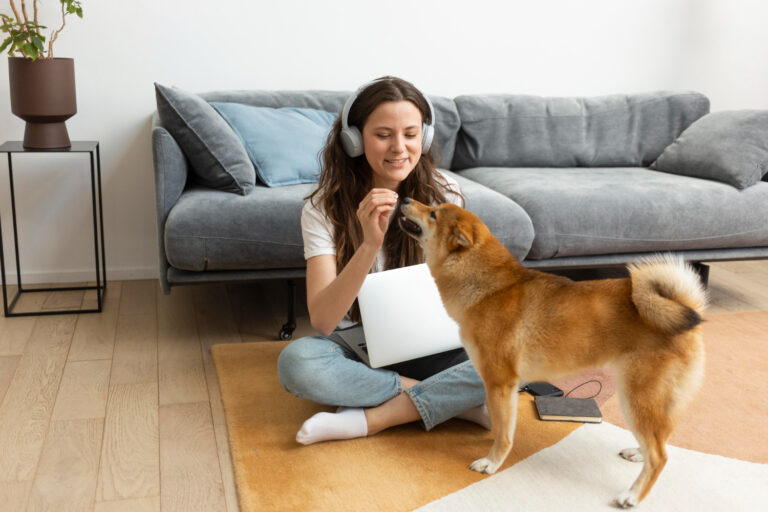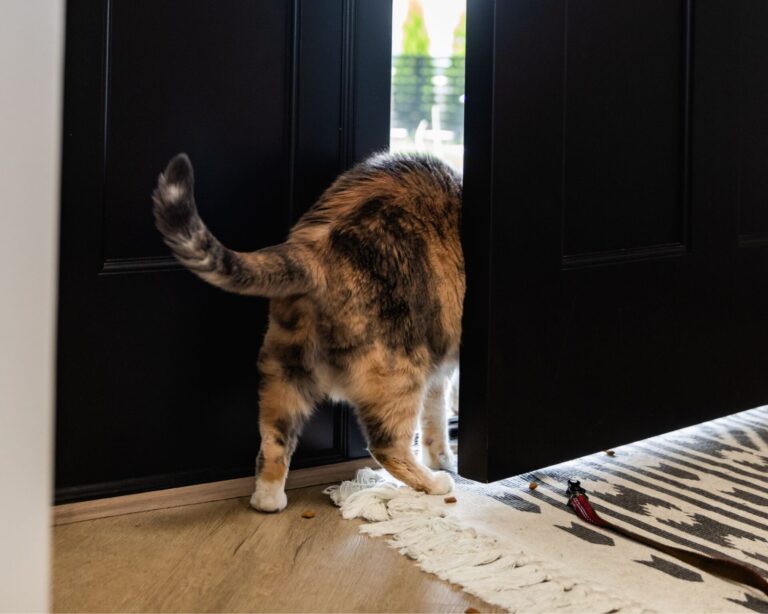The world has changed dramatically in the past few years, and for pet owners, life looks very different from what it once was. With remote work becoming the new normal, many Canadians are now spending more time at home with their pets than ever before.
While the close bond we have built with our pets is one of the silver linings of the pandemic, it is important to remember that some risks have not disappeared. In fact, new routines can bring unexpected challenges. No matter how close you are to your furry family member, one thing remains critical: ensuring they are microchipped and properly registered.
Table of Contents
How Remote Work Strengthened the Human-Animal Bond

When offices shut down and kitchen tables became workstations, pets suddenly found themselves with full-time companionship. Dogs went on more walks. Cats became Zoom call celebrities. Anxiety, loneliness, and uncertainty were made a little easier by the loyal presence of a pet.
The surge in pet adoptions during the pandemic reflected this shift. Shelters across Canada, including BC SPCA locations, reported record-high adoption rates in 2020 and 2021. Many people discovered the emotional comfort of having a four-legged coworker by their side.
Even today, with hybrid models and flexible schedules, pets are deeply woven into the daily lives of millions of Canadians. Pets have become more emotionally bonded to their families, and owners now seek ways to keep them healthy, happy, and protected.
The Hidden Risks of Home-Based Pet Parenting

It might feel like being home more often reduces the chance of a pet going missing. But in reality, new daily habits bring different kinds of risks:
- Deliveries and visitors: Frequent package deliveries mean more doors opening and closing throughout the day. Pets can slip out quickly without being noticed.
- Backyard access: Many remote workers let pets roam freely in the backyard. While yards feel safe, they are not foolproof. Gates can be left open or fences damaged without realizing it.
- Travel and work flexibility: Working remotely often means taking extended trips to cottages, new cities, or even short-term rentals. In unfamiliar places, pets are more likely to get lost.
- Pet sitters and daycares: Pets new to sitters or daycares are surrounded by unfamiliar people and environments. Stress, curiosity, or confusion can make them more likely to bolt or slip away while adjusting to the new setting. Learn why sitters should know your pet’s microchip number.
- Changes in routine: With the mix of home life and work life, owners can become distracted. Pets can seize those small windows of opportunity to slip out during a video call or a delivery.
Even the most loving and responsible owners can experience these unexpected moments. That is why a microchip, properly registered, remains a key piece of modern pet care.
Why Microchipping Is Essential in a Work-From-Home Society
A microchip provides a permanent, tamper-proof form of identification that is more important today than ever before. Even when you are home most of the day, unexpected moments can put your pet at risk.
Registered microchips offer:
- Permanent Identification: Unlike collars and tags that can fall off or break, a microchip stays with your pet for life.
- Fast Reunions: If your pet does escape during a delivery or while you are focused on work, shelters and vets can scan them and contact you quickly.
- Protection During Everyday Distractions: Working remotely often means balancing meetings, deadlines, and home responsibilities. Even the most loving pet parents can be momentarily distracted. A registered microchip ensures your pet is protected even when accidents happen.
Remote workers trust microchips to be a silent safety net, always there even when life gets busy.
How BC Pet Registry Supports Pet Safety Across Canada

Beyond helping individual pets reunite with their families, BC Pet Registry is proud to play a leadership role in advancing pet safety and animal welfare across the country.
Here are just a few ways BC Pet Registry is making a difference:
- Educational Partnerships: BC Pet Registry has partnered with Douglas College to support veterinary students with real-world microchip scanning training. This helps ensure the next generation of veterinary professionals are fully equipped to prioritize pet reunification.
- Community Initiatives: Registration fees help fund programs and community outreach that raise awareness about responsible pet ownership and microchipping.
- Internationally Traceable: Although based in British Columbia, BC Pet Registry’s database is accessible worldwide, giving pet owners peace of mind no matter where they live or travel.
By registering your pet with BC Pet Registry, you are not only protecting your own family but also supporting a wider movement for pet safety and education.
Learn more about how BC Pet Registry gives back to the community.
Tips for Keeping Pets Safe in a Remote Work World
- Create a safe delivery protocol: Secure pets in another room before opening the door.
- Supervise outdoor time: Check fences and gates regularly for wear, especially after storms or heavy winds.
- Update microchip information: If you move, change your phone number, or even add a secondary emergency contact, make sure your pet’s information is current.
- Travel carefully with pets: Bring familiar toys, bedding, and identification when working remotely from a new location.
- Use collars and ID tags: While microchipping is critical, a collar with an ID tag provides an additional way for someone nearby to contact you quickly. Learn why every pet needs both a tag and a microchip.
Be a Part of the 80% Responsible Owners
During our recent events, we scanned hundreds of pets, all with microchips implanted. Only to discover that approximately 20% of the pets’ microchips are not linked to any registries in North America. We recommend all pet owners to double check their pet’s registration and directly registering with us. All you need is the microchip number and/or tattoo code to start the online registration process. For a small, one-time fee of $45, your pet will be protected for a lifetime and you will also have contributed to the life-saving work of the BC SPCA.
Love, Work, and Lifelong Protection

Remote work has brought pets and people closer than ever, but it has not eliminated the risks that come with everyday life. Whether you work from home, travel with your pet, or simply enjoy spending more time together, microchipping and registration are still the best tools for keeping them safe.
Microchipping is a simple step that offers a lifetime of protection. It brings peace of mind, knowing that even if the unexpected happens, your pet has a way back to you.
If you have not registered your pet’s microchip yet, now is the perfect time.
Because no matter where life takes you or how many Zoom calls your pet joins, they deserve to always have a way home.
FAQ
Q: Do indoor pets really need microchips?
Yes. Even strictly indoor pets can escape unexpectedly through open doors, windows, or during emergencies.
Q: Can I update my pet’s microchip information if I change jobs or move?
Absolutely. BC Pet Registry makes it easy to update your details online anytime.
Q: Is it expensive to microchip and register my pet?
No. Microchipping is a one-time procedure, and BC Pet Registry charges a one-time fee of $45 for lifetime registration.
Q: Does microchipping replace the need for a collar and tag?
No. Both are important. A collar and tag provide immediate local identification, while a microchip provides a permanent and reliable backup if the collar is lost.

